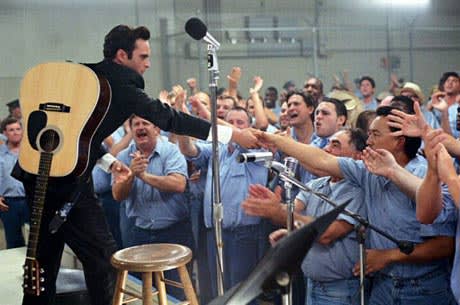Director James Mangold took on a huge task telling the complicated tale of Johnny Cash, a man divided by warring desires, and this extended cut of Walk the Line offers great perspective on why Cash the man was such a compelling figure. There are so many clichés to Cashs rise, fall and resurrection in the 50s and 60s that Mangold and co-writer Gill Dennis fostered a love story about Cash and June Carter first and a character analysis second. (Though the legendary fact that Cash declared hed marry Carter the very first day they ever met, as discussed in the "Ring of Fire featurette, is inexplicably not part of the film.) In spite of Reese Witherspoons Oscar-winning turn as Carter, the jurys still out as to whether Walk the Line is more than "Ray for white people. Playing Cash as a rising country singer, an adulterer, a road-addled amphetamine addict, a washed-up star and a clean-and-sober comeback kid blazing a new trail for popular music, Joaquin Phoenix has his hands full and it shows. But as Mangold claims throughout a commentary track, Phoenix recognised the conflicted figure he was portraying a gifted songwriter with a joy for entertaining country and rock audiences yet unhappily hell bent on a path of self-destruction. As the "Cash and his Faith featurette suggests, the surly Cash characterised here hasnt yet found Jesus and, instead, pours his heart into his music and, by extension, a loving musician in Carter. Initially chosen by Mangold based on a newspaper article photo promoting Gladiator, Phoenix flies headlong into his role, learning to play guitar and sing. In the "Becoming Cash/Becoming Carter featurette, music supervisor T-Bone Burnett recounts his idea to have Phoenix and Witherspoon record an entire album in character before shooting began. As a result, Phoenix, who insisted on being called "J.R. while on set (after Cashs first initials), discovered a way to drop his voice an entire octave and sparked the chemistry that made he and Whitherspoon such a dynamic couple onscreen. Occasionally unconvincing, Phoenix encounters reasonable obstacles in playing an archetypal icon. In "The Cash Legacy and "Celebrating the Man in Black: The Making of Walk the Line featurettes, friends and fans (i.e., Kris Kristofferson, Willie Nelson, Merle Haggard, Trent Reznor, "Cowboy Jack Clement, Mike Ness, etc.) and, for some reason, Henry Rollins espouse the myriad ways in which Johnny Cash altered the cultural landscape by being the most thoughtful, honest and pure outlaw around a "genre of one. Mangold faces down the tall order of rendering Cash by framing Walk the Line with the infamous and wildly successful Folsom Prison performance, highlighting the danger and compassion within the man, and typifying someone who defied expectations at every turn. Plus: extended musical sequences, deleted scenes, more.
(Fox)Walk the Line: Extended Cut
James Mangold

BY Vish KhannaPublished Apr 8, 2008